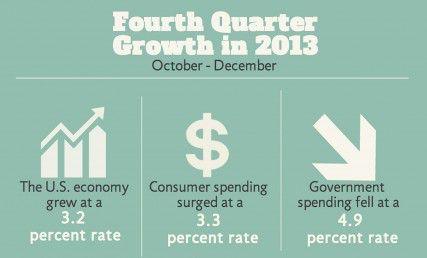
As President Barack Obama announced his prediction for large economic gains in 2014, students graduating from schools such as Boston University could see increases in job opportunities.
“The last few years have been quite good for corporate bottom lines and investors,” said Douglas Kriner, a professor of political science at BU’s College of Arts and Sciences. “If firms feel the time is right and decide to invest in new workers, job gains could directly benefit new graduates.”
In a speech given to the General Electric Energy Waukesha Gas Engines Facility in Waukesha, Wis., Obama announced that in the last quarter of 2013, increased consumer spending supported economic growth in 2014.
“I believe this can be a breakthrough year for America,” Obama said. “After five years of hard work, digging ourselves out of the worst recession of our lifetimes, we are now better positioned in the 21st century than any other country on Earth. We’ve got all the ingredients we need to make sure that America thrives.”
In the final quarter of 2013, the annual economic growth rate reached 3.2 percent, according to a government report released Thursday.
The recent growth indicates economic prosperity in the coming year as well as a recovering economy, said Kevin Lang, a CAS professor of economics.
“We’ve had continued employment growth, and recoveries tend to build on themselves,” Lang said. “… The fact that the economy continues to show signs of recovery makes it hopeful that it will do so for the next year.”
Lang said growth in the economy creates job prospects for college graduates because employers do not need to be as discriminating toward who they are hiring.
“When the job market gets better, it gets easier to be hired without experience or with less experience, and ultimately the salary offers go up,” Lang said. “… We still have a high enough employment level that we shouldn’t expect to see a lot of wage inflation any time soon, but certainly it will help students get jobs, probably get jobs that are more to their liking.”
While the lagging economy of past year has caused Americans to suffer in the labor market, students from BU receive the necessary skills to meet employers’ standards, Lang said.
“Students who graduate college in a bad labor market do not surprisingly suffer from entering in the labor market,” Lang said. “The adverse affects seem to last for quite a while, certainly through 10 years of being in the labor market. The positive side [is that] those adverse affects seem to be less problematic for the most skilled. So coming out of an elite university like Boston University, the adverse affects are smaller.”
Ena Selmanovic, a School of Management freshman, said graduates from SMG generally have good career prospects because of the school’s curriculum.
“Graduates from SMG, even undergrads, have good job prospects, so I feel safe,” Selmanovic said. “In business you have to work with people, and even starting in freshman year, they [SMG] put a lot of emphasis in working in teams … If you’re able to do those things you’re already on the right track.”
College of Fine Arts sophomore Cassidy Early said BU’s emphasis on internships increases her confidence of getting a job after graduation.
“BU prepares us well,” Early said. “They really push internships as important because I don’t think I’d go out and try to find an internship with painting … They [BU] do a good job of telling you that there are some [internships available]. I found one that is for gallery work.”
Christopher Sanchez, a CAS freshman, said having a liberal arts background instills a diverse skillset in future job applicants.
“I’m in CAS and I feel like its more liberal arts that they want to teach you, with writing and math and science,” Sanchez said. “It gives you a good part of preparing you for the different things you might encounter, increasing the professionalism of the individual.”

















































































































